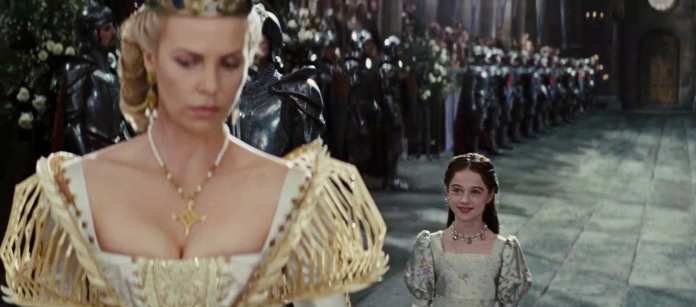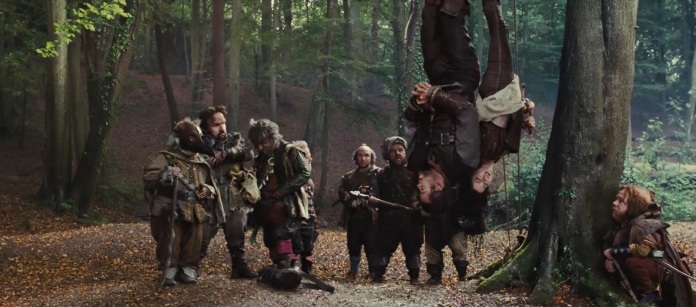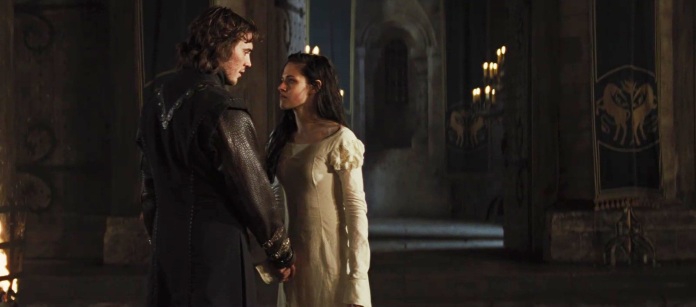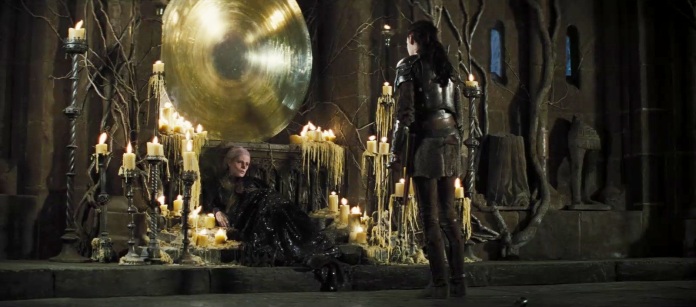.

Director: Rupert Sanders
By Roderick Heath
My recent encounter with the greatness of Fritz Lang’s Die Nibelungen fired up my hunger for fantasy-adventure cinema again. Few films new or old could be expected to measure up to such a standard, but I still ventured out in search of satiety to the nearest multiplex, where the promise of a contemporary fix awaited in the form of neophyte director Rupert Sanders’ aggressive reframing of the Snow White myth as grim(m)ly inflated epic. For most folks, naturally, the essential, classical vision of Snow White is the trilling teen in medieval garb sweeping up between songs, as found in Disney’s game-changing animated film of 1937. The actual Grimm Brothers story, hewed from a folktale which had spread in variations right across central Europe, is a good distance from that cutely domesticated version. Whilst the Disney film retained faint echoes of its fundamental darkness, the source material proffered some epic cruelty, ending properly when the Evil Queen was hoist by her own fashion-diva petard, forced to put on a pair of red-hot iron shoes, and danced about in agony until she fell down dead. Such is the shudder-inducing climax of a tale couched in the visceral strangeness and unfiltered emotional and psychological wellsprings of such tales.

Sanders’ attempt to present a more grown-up, gritty, warrior-princess version of the legend isn’t the first to try to move back towards the source material: 1997’s TV-made Snow White: A Tale of Terror has a minor cult following who enjoy its outright gothic nasty, and some classic horror films like Argento’s Suspiria (1976) have invoked it. Snow White and the Huntsman, however, aims more for dark-hued adventure, a template which at first might make most think of The Lord of the Rings films. On closer inspection, it is closer in spirit to a tradition of modern fantasy filmmaking like Krull (1984) or The Neverending Story (1984) or Willow (1987), and, proportions maintained, mainstreams the mythopoeic inquiries of John Boorman. Director Sanders, amazingly, is a first-time filmmaker, plucked from directing British advertising, thus putting him squarely in a column with Ridley Scott and Legend (1985), as well as Hugh Hudson and his revisionist Tarzan epic Greystoke: The Legend of Tarzan, Lord of the Apes (1984), which also prefigure this kind of film.

Snow White and the Huntsman has proved a surprise hit with audiences in spite of largely mixed reviews from critics, and perhaps both responses have similar reasons, for the film has clearly managed to dovetail young audiences of the moment: Kristen Stewart loyalists from the Twilight franchise and fans of the sturdy heroine of The Hunger Games (2012). The first franchise almost immediately exhausted critical goodwill and the second will soon enough, but I found Snow White and the Huntsman vastly superior to either; it represents a formidable, if hardly flawless, entry in the genre, more evolutionist than revisionist. The film’s essential pitch mimicks a contemporary craze infiltrating a lot of modern takes on retro culture by freely rearranging their elements with ironic disparities, if not quite on a level with the overt absurdity of mash-ups like Abraham Lincoln: Vampire Hunter (2012) or the pseudo-novel Pride and Prejudice and Zombies. Snow White, even in the older, nastier, story, is a traditionally passive figure, the adolescent changeling victimised by an avatar of aging, narcissistic, self-loathing femininity, who finds harbour taking care of seven boy-men, and is finally awakened from a rapturous coma of pubescence by the kiss of sexual awakening. The sense of hierarchy encoded in the tale is inevitably retrograde, and Snow White and the Huntsman takes the risk of sounding like one of the popular Politically Correct Fairy-Tales books from the ’90s in disturbing the tale’s internal tensions, which like most folktales practically screams for Freudian interpretation as a metaphor for essential processes of youth, the fear of the mother being supplanted by the daughter, and the drug-like intensity of the most intense moments of puberty. If there’s a problem with giving such tales a warlike makeover, it is, of course, in the sense that the innately feminine material has to take on a macho aspect, as if girls are only strong when they’re acting more like men.

Still, Sanders and screenwriters Hossein Amini, Evan Daugherty, and John Lee Hancock, take the hierarchism seriously, positing Snow White as a princess who gradually takes on an aspect clearly inspired by the concept of King Arthur in Boorman’s Excalibur (1981) as a unifying entity who is intimately tied to the natural as well as human order. Thus, Snow White’s familiar coterie of trailing animals is recast from simply reflecting her niceness to symbolise the way she becomes the fulcrum for a return of that order, and steps into her father’s place as the anointed ruler of the hazily medieval kingdom in which the drama unfolds. Snow White and the Huntsman succeeds, unlike last year’s post-Twilight fairytale reconfiguration, Red Riding Hood, in restoring gothic grandeur and a sense of metaphysical, Manichaean weight to the folktale panoply.

In a lengthy prologue, the recent history of the medieval kingdom of Tabor is laid out by Chris Hemsworth’s narrating hero, equipped with amusing Scots accent, as King Magnus (Noah Huntley), and Queen Eleanor (Liberty Ross) give birth to a baby whom the Queen dubs Snow White because of her wish to have a pale-skinned child that would match the perfect beauty of blood on snow. Snow White (played as a girl by Raffey Cassidy) grows up friends with William (Sam Claflin), an occasional teasing brat who’s the son of her father’s loyal brother, Duke Hammond (Vincent Regan). Not long after her mother dies during a harsh winter, a mysterious army attacks the kingdom. Magnus rides out to battle but finds the enemy are magical simulacrums that shatter into metallic fragments when struck. He rescues from their midst a prisoner, the stunning Ravenna (Charlize Theron), and, enchanted by her looks, decides to marry her. But she poisons and stabs him in the marriage bed, consummation of her plot to take over this kingdom as she had done with several others. Her real army steams in and slaughters everyone in the castle except William, who just manages to escape, and Snow White, who is secretly kept captive in a lofty prison where she grows into the adult shape of Stewart.

Ravenna’s malignant regime slowly reduces Tabor to a wasteland, while she has been keeping herself young and beautiful thanks to a spell woven by her witch mother and the occasional ingestion of the life force of other pretty young women. When the advising magical mirror she keeps on the wall (here a large bowl of polished brass that disgorges a liquid metal familiar) tells Ravenna she can secure her state forever by plucking out the heart of Snow White now that she is of age, she dispatches her unctuous brother Finn (Sam Spruell) to fetch the girl. When he tries to ravish her before delivering her to his sister, Snow White stabs him with a nail torn from the wall and manages to lock him in her cell. She flees the castle through its sewer only to be stranded in inhospitable terrain, finally collapsing in the midst of a miasmic, evil-infested forest.

Enter Eric the Huntsman (Chris Hemworth), stage hunky, freshly plucked from a trough after losing a tavern brawl by Finn, for he’s one of the few men who know their way around that stygian woodland. Ravenna coaxes Eric into the venture by promising to revivify his dead wife. But once he’s led Finn and his team through the woods and located the trapped and desperate Snow White, Eric realises he’s been lied to. He kills Finn’s men and chases Finn away, and irritably leads Snow White, whose identity he is unaware of, out of the forest and into the care of a village of women and children who are hiding out from Ravenna whilst their husbands are off fighting with Hammond’s resistance, in which William is proving himself a budding hero. Finn is sent out by his recriminating sister with a large force, and William, having learned that the royal sibling is hunting the girl he thought was dead, joins up with Finn’s army in hopes of finding her. When Finn’s army attacks the village, Eric is forced again to save Snow White and flee with her into the wilderness, where they are taken prisoner by a gang of dwarf bandits, including Muir (Bob Hoskins), Beith (Ian McShane), Coll (Toby Jones), Gort (Ray Winstone), Duir (Eddie Marsan), Nion (Nick Frost), Gus (Brian Gleeson), and Quert (Johnny Harris). With Finn still on their tail, the lot of them flee into the deepest, enchanted glades of the forest, where fairies flitter through the air and the land still hasn’t been poisoned by Ravenna’s influence. A colossal white stag, embodiment of the natural order in the forest, pays homage to Snow White as its human equivalent.

Sanders fills his film with some derivative but still consistently striking visuals, achieving a genuine majesty and hallucinatory intensity at some points and investing the tale with a lucidly sensual feel: there’s a heady, aptly symbolic force behind his recurring employment of motifs of blight and rot despoiling pure mantles, from blood dripping into blindingly white milk to the contrast of black crows and dark trees with the dazzling lightness of snow, that convey visually the essential oppositions of spirit. The two über-femmes at war in the narrative convey divergent visual textures in their physiognomies whilst, natch, their internal selves are opposite: Snow White embodies the contrast of light and dark, blight and purity, with her hyper-contrasted beauty, and yet she is, of course, all good, whilst Ravenna’s efforts to retain an unblemished exquisiteness sees her retain the look of the honey-haired golden girl, except, of course, she has a howling void where a soul should be. In one weirdly affecting and beautiful moment that tweaks an old sexploitation gimmick in DeMille epics, she bathes in a tub filled entirely with milk, rising out of the fluid coated in the stuff as if she’s made out of plaster, whilst the run-off is collected by desperately hungry peasants. Ravenna congratulates herself for this generosity, recalling her own days of childhood struggle with Finn. Meanwhile, Snow White subsists in her chilly, barren cell, gazing up toward the sun she’s only seen through a narrow aperture for years, looking disturbingly like a concentration camp survivor, her sturdy bone structure still impressive in spite of her pale and filthy form.

Sanders, then, whilst joining the ranks of many directors tackling fantastical fare for the sake of making a name for themselves perhaps on the way to other things, actually seems to have an affinity for this material: the scenes in the refugee village situated in a reedy marshland reminded me, oddly, of moments in Mizoguchi’s Ugetsu (1953), and a similar sense of chaos surrounding fringe worlds of subsistence invades the scenario here. He imbues his film with tactile qualities in engaging with the pseudo-ancient, mystically pervaded world it portrays, and it helps that he displays a fairly judicious sense of when to employ CGI and when not to, making the film one of the most profitable fusions of new and old approaches. There’s a wild grandeur to the sequence in which Snow White, escaping her castle prison, has to hurl herself into the sea to escape from high, ragged cliffs and is swept ashore, and an air of malevolence in her subsequent struggling through the stygian forest after leaving her horse trapped in the surrounding mire (recalling a key moment in The Neverending Story). The edge of malevolent anthropomorphism the Disney film loaned this portion of Snow White’s odyssey is here built upon, with trees that harbour batlike demons and mossy growths that sport winking eyes, as if the poor girl has stumbled into the very swamp of the id. Later, as heroine and helpmates take refuge in the faerie glades, stylisation takes a sharp swerve toward more familiar visions of lustrous nature, as a pantheistic undertone emerges, conflated, as in the Siegfried and Arthurian myths, with an overlay of Christian idealism—Snow White, early on, prays when alone in her cell to offset the misery of life under Ravenna—where a natural balance can be restored. Snow White’s holistic link to the world around her, giving a deeper, less immediately chauvinist meaning to the way the word “fairest” attaches to her, is first signaled when she and Eric are attacked by a troll in the haunted forest, a terrifying beast that swats Eric seven ways from sunset but investigates the girl with respectful interest. Nonetheless, Eric’s essential decency is proven as he (grudgingly, of course) takes on the job of protecting rather than hunting Snow White.

Ravenna is one of the more engaging villains in a mainstream film of recent years, and Theron, who, Monster (2001) Oscar notwithstanding, has had a difficult time finding a true niche in Hollywood, presents her as a memorably egomaniacal creature who throws temper tantrums like a super-villainous Lucy Van Pelt and justifies her utterly rapacious hostility through rewriting all reality according to her personal prejudices. There is sympathy for this devil: the spell her mother worked was designed to help her retain her beauty in full knowledge it would be her best weapon in a brutal, covetous, sexist world, and harsh experience has made her misanthropic beyond all reason. Her worst moments of evil are almost always capped by proclamations of her own righteousness as an avenger of past wrongs, rich against poor, man against woman, whilst, of course, she is doomed to constantly repeat those crimes in her sociopathic ruthlessness, devastating the wealth of Tabor and reducing it to a poverty-stricken hell hole, and leaching off young women with literal, relentless parasitism: Eric’s wife, we learn eventually, was one of the many reduced to a haggard husk by this parasitism, and then killed by Finn. This spin on the Bathory myth gives heft to a more immediate drama being enacted here, between the older woman/actress whose days as a stunning beauty are numbered, and the younger woman/actress who is supplanting her. As some of the less gentlemanly comments I read up to the date of the film’s release pointed out, Stewart is a less classical beauty than Theron, a contrast that is aptly exploited throughout, particularly in the finale where Stewart takes on an amusingly butch façade in leading her army against Ravenna’s.

Rest assured (for better or worse), this is not the post-don’t-ask-don’t-tell Snow White. Our heroine has two guys to choose from (probably as another result of Twilight, love triangles are definitely back in), but the film further tweaks the familiar tale, as Eric proves to be the true love whose kiss will rouse the girl from her coma. Said coma is induced when Ravenna, in one of the film’s more peculiarly protean twists, transforms herself into William and feeds Snow White the poisoned apple, the forbidden fruit taking on suggestively Sapphic dimensions. Sadly, explorations of the erotic dimensions of fairy tales, as in predecessors like Legend or The Company of Wolves (1984), are as verboten these days as it is in the superhero genre, and the sensual edge of Sanders’ filmmaking never gets any real manifestation save in the inevitable climactic moments where we wonder which necrophile hero will revive the heroine. Instead, today’s fantastical filmmakers are expected to stress such material as avatars for less internal, symbolic, intuitive problems, a la the faux civics of Christopher Nolan’s Batman movies as opposed to the fetishism of Tim Burton’s, or the naïve romanticism of Peter Jackson’s King Kong, as opposed to the monstrous sexuality of the original. Whilst the schism between William and Eric as a potential partner take on clear, social dimensions—William is sleek, ardent, boyishly pretty, whereas Eric is a hulking, virile proletarian—the film avoids making either one morally or physically lesser or covertly villainous to make for a simple choice for our heroine. Finally, the rough-trade huntsman wins out because he’s more substantial than his nobleman rival; damaged, aggrieved, and occasionally boorish, he is nonetheless stolidly reliable and swaggeringly sexy.

Whilst Eric is a fairly lumpen hero, I will cop to a bit of a man-crush on Hemsworth, who’s got all my good will after his turns as Thor; unlike too many would-be beefcake icons of the last few years to rise in Hollywood, he actually offers charm and hints of acting chops to back up the physique, whilst also dwarfing some who have tried to mould themselves into an action hero. Speaking of dwarves, the little guys who form a warrior band that guard Eric and the Princess are played by an astounding battery of fine British character actors (though perhaps it is a bit egregious to cast such actors in such parts, especially when Warwick Davis needs work) and characterised as pugnacious yeomen, classically working-class and frustrated, angry, and depressed by having lost their self-respect as miners and craftsmen. They prove eager, in spite of their initial criminal misanthropy, to sign on the Princess’ adventure, and the notion of a kind of class rage driving a desire for regime change flows through Snow White and the Huntsman with surprising doggedness, if not exactly depth.

If there’s a fundamental problem with Sanders’ film, it manifests mostly on a scripting level. Not that there’s anything overtly bad about it: composed by an unlikely battery of serious wordsmiths, including Amini, who wrote Iain Softley’s brilliant unpacking of Henry James’ The Wings of the Dove (1997) and Nicolas Winding Refn’s Drive last year, and Hancock, whose The Alamo (2004) was unfairly dismissed. But in grafting the Grimm brothers’ tale onto a familiar fantasy-adventure template, Snow White and the Huntsman accepts that template too completely, hitting all the obvious story points. It kills off a likeable character at a crucial moment to give the last act emotive juice, and charges into an action finale that, like some weaker modern fantasy-adventure films (Willow and Robin Hood: Prince of Thieves, 1991), culminates in a dully staged tussle between heroine and villainess in a remote tower when they could be using the whole world as an arena.

It’s this lack of fundamental imagination on a story level that finally retards the very real qualities of Snow White and the Huntsman—with so much potential ground to cover, was remaking every swashbuckler where an exiled princeling fights to reclaim the kingdom really all they could come up with? Yet there’s a fascinating tension in the depiction of Snow White as embodiment of all the fundamental graces who must learn how to kill, even if it is an entirely evil enemy, to restore her world. When Eric’s kiss jolts the Princess out of her coma, she’s not merely awakened but born again hard, wandering out before her mourning subjects and sparking them to life in turn with the compulsory rousing speech, and appearing moments later in armour to lead the cavalry out. It’s a gleeful and pretty hot image, though I could have used a better, more attentive sense of build-up to this moment.

But the charge of the cavalry along the shore to Ravenna’s castle, with our heroes in the lead and the dwarves inside the castle to raise the portcullis for them, is a truly thrilling moment of epic sweep, strongly reminiscent of the finale of El Cid (1961), The Lion in Winter (1968), and the best scene in Scott’s otherwise ramshackle Robin Hood (2010). The fade-out leaves what will happen in her budding romance with Eric, who hovers uncertainly at the edges of the royal pomp of her coronation and for whom she looks in initially frantic distraction, perhaps to be reconciled in the proposed sequel in the works. For once, I look forward to a sequel, in the hope that Sanders can broaden his mythic imagination without losing his grasp on the finite mixture he sustains here.

Ha, Rod! The gossip columnists have been having afield day over the past week with the alleged “affair” between Stewart and director Sanders:
http://www.huffingtonpost.com/2012/07/28/kristen-stewart-cheating-_n_1711990.html
In any case I never got to this one, unmotivated at a time of heavy festival activity, by the lackluster reviews. But your own massive essay here, disclaimers and all, and some others from writers I respect, have made a compelling case for the fantasy, all seemingly in agreement on the visual style and the negotiation of atmosphere. I am most assuredly a fan of John Boorman’s EXCALIBUR, which you note here, among a plethora of references, most of which I know well and tried to connect, sight unseen. I could well understand the issues here would be with the script, which on the positive side is the epic sweep that recalls some great classics. I’ll certainly get to it down the road.
LikeLike
Hi Sam. Yeah, that scandal broke at just the right moment to have me going “oh dear” with this oblivious piece up, but it’s been chiefly feeding me derisive snort material. I can’t say I was hugely surprised though – it’s funny how you can receive the vibe from a movie that shows off a director’s crush on his leading lady. All that aside, yes, this is a good movie that manages to avoid some of the pitfalls that a lot of these things fall into, and sustains both grandiosity and mood alongside coherent storytelling and a certain depth without feeling bogged down by its own self-importance, unlike a certain movie featuring a man in a flying mammalian costume I watched last night…
LikeLike
I have to say, I was pleasantly surprised by this one. So much in fact that it’s currently my favorite summer popcorn movie thus far, and perhaps even a strong candidate for my Top 10 of the year; we’ll se how it goes.
But, yeah, I liked it. The narrative lags a bit throughout the mid stretch and maybe a number of set pieces are derivative, or inspired, depending on how you look at it. One of the aspects I liked is how unaffected the movie was by any kind of pretense or self-importance. Yes, it takes the story very seriously, but there’s an earnestness to the whole affair. There are no outward proclamations being made or any particular, current political/social issues referenced for notoriety. The bulk thematic sustenance is strong but equally self contained and, unlike other “weighty” movies this summer, better expressed through striking imagery and art-direction.
I agree with your critical associations with Lang’s Die Nibelungen and 80s fantasy fare like Legend, Krull and The NeverEnding Story. Also, maybe Dragonslayer, too. This movie immersed itself into a classical, gothic fantasy world with the utmost sincerity. As for the whole Stewart-Sanders scandal, I couldn’t care less in any negative sense, though, there is no question that the “camera” here is definitely infatuated with Stewart’s near-feral, boyish beauty (frankly, so am I).
LikeLike
It seems we’re in scarily close agreement, Cannon, on just about everything you’ve said there. Yes, Dragonslayer too; good call.
LikeLike
I don’t understand why people disliked this one. It was extremely enjoyable and very re-watchable. I included it in my Best of 2012 (So Far) List as an honorable mention: http://randomfilmbuff.com/2012/08/04/d-8/
LikeLike
It seems, Alley, that this film is going to be one of the year’s more quietly appreciated fables.
LikeLike